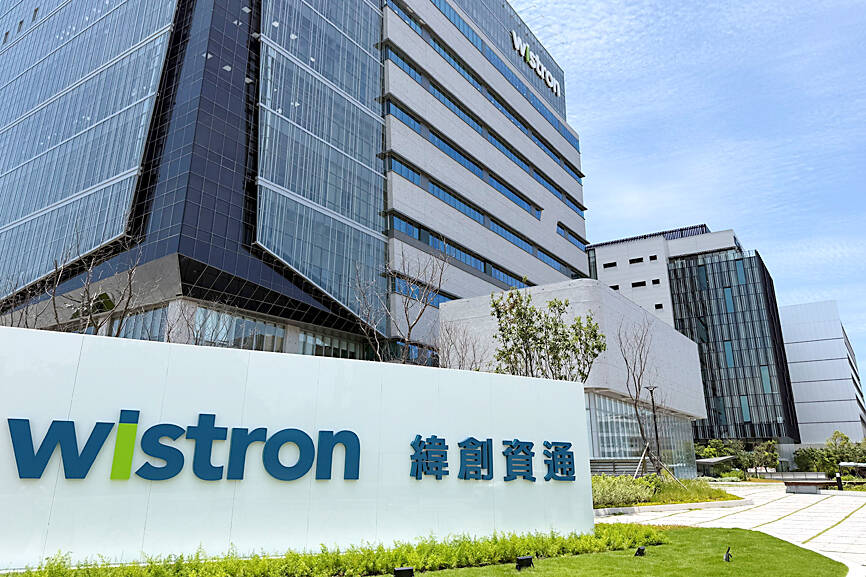Wistron Corp (緯創) yesterday said that its board of directors approved a plan to inject an additional US$45 million in capital for its US subsidiary WisLab EMS Corp, as well as authorizing capital expenditure of US$55.9 million to upgrade WisLab’s factories to meet growing demand for artificial intelligence (AI) server production.
California-based WisLab has conducted pilot runs of AI server production, a Wistron official told the Taipei Times by telephone.
The capital injection aims to boost its capabilities in research and development (R&D), and testing and mass production of advanced servers, the official said.

Photo: Lee Wen-yee, Reuters
The upgrade would expand the California site’s production scale, they said.
The plant, originally used to produce medical and industrial control products, would be shifted to technically demanding AI server development, while a site in Dallas, Texas, would handle higher-volume assembly, the official said.
The capital injection is not directly tied to concerns over potential US tariffs on Taiwanese goods, but aims to improve client cooperation, while Wistron continues to mitigate tariff risks through its global deployment, they added.
In early May, Wistron injected US$455 million into its Dallas-based subsidiary Wistron InfoComm (USA) Corp to expand capacity, undertake facility improvements and procure machinery at its Westport and Eagle sites, which are to handle large-scale production and after-sales services, with mass production set for the first quarter next year.
Aside from the US deployment, Wistron has also been expanding its local production sites.
Wistron last month inaugurated a new AI park in Hsinchu County’s Jhubei City (竹北), with the site expected to become its largest global production base for AI servers within one to two years.
Most of the capacity in Jhubei would be for Nvidia Corp orders and the site would potentially increase its total of AI server facilities to 10.
The park inauguration was followed by a groundbreaking ceremony for a new R&D center in Taipei’s Neihu District (內湖) on Monday.
The company on Monday said it has not observed clients adjusting front-loading schedules or requesting supply shifts following US President Donald Trump’s announcement of tariffs of up to 30 percent on Mexican goods.
The firm has contingency plans in place, it added.

IN THE AIR: While most companies said they were committed to North American operations, some added that production and costs would depend on the outcome of a US trade probe Leading local contract electronics makers Wistron Corp (緯創), Quanta Computer Inc (廣達), Inventec Corp (英業達) and Compal Electronics Inc (仁寶) are to maintain their North American expansion plans, despite Washington’s 20 percent tariff on Taiwanese goods. Wistron said it has long maintained a presence in the US, while distributing production across Taiwan, North America, Southeast Asia and Europe. The company is in talks with customers to align capacity with their site preferences, a company official told the Taipei Times by telephone on Friday. The company is still in talks with clients over who would bear the tariff costs, with the outcome pending further

NEGOTIATIONS: Semiconductors play an outsized role in Taiwan’s industrial and economic development and are a major driver of the Taiwan-US trade imbalance With US President Donald Trump threatening to impose tariffs on semiconductors, Taiwan is expected to face a significant challenge, as information and communications technology (ICT) products account for more than 70 percent of its exports to the US, Chung-Hua Institution for Economic Research (CIER, 中華經濟研究院) president Lien Hsien-ming (連賢明) said on Friday. Compared with other countries, semiconductors play a disproportionately large role in Taiwan’s industrial and economic development, Lien said. As the sixth-largest contributor to the US trade deficit, Taiwan recorded a US$73.9 billion trade surplus with the US last year — up from US$47.8 billion in 2023 — driven by strong

A proposed 100 percent tariff on chip imports announced by US President Donald Trump could shift more of Taiwan’s semiconductor production overseas, a Taiwan Institute of Economic Research (TIER) researcher said yesterday. Trump’s tariff policy will accelerate the global semiconductor industry’s pace to establish roots in the US, leading to higher supply chain costs and ultimately raising prices of consumer electronics and creating uncertainty for future market demand, Arisa Liu (劉佩真) at the institute’s Taiwan Industry Economics Database said in a telephone interview. Trump’s move signals his intention to "restore the glory of the US semiconductor industry," Liu noted, saying that

AI: Softbank’s stake increases in Nvidia and TSMC reflect Masayoshi Son’s effort to gain a foothold in key nodes of the AI value chain, from chip design to data infrastructure Softbank Group Corp is building up stakes in Nvidia Corp and Taiwan Semiconductor Manufacturing Co (TSMC, 台積電), the latest reflection of founder Masayoshi Son’s focus on the tools and hardware underpinning artificial intelligence (AI). The Japanese technology investor raised its stake in Nvidia to about US$3 billion by the end of March, up from US$1 billion in the prior quarter, regulatory filings showed. It bought about US$330 million worth of TSMC shares and US$170 million in Oracle Corp, they showed. Softbank’s signature Vision Fund has also monetized almost US$2 billion of public and private assets in the first half of this year,